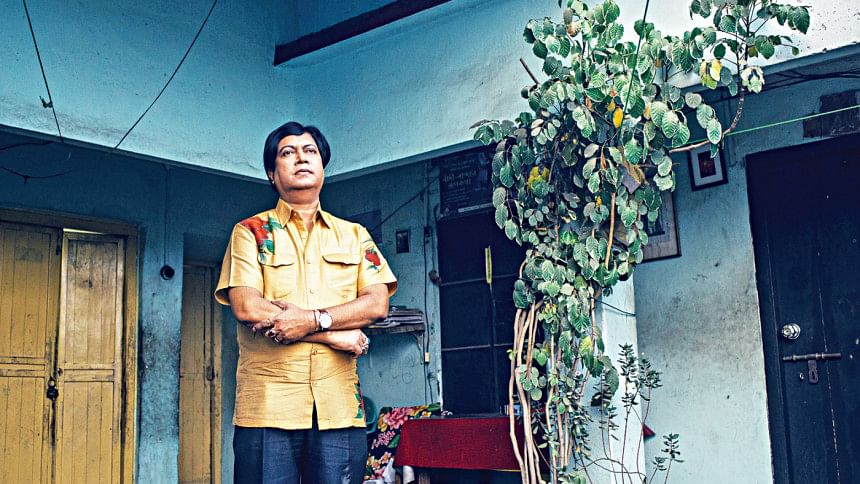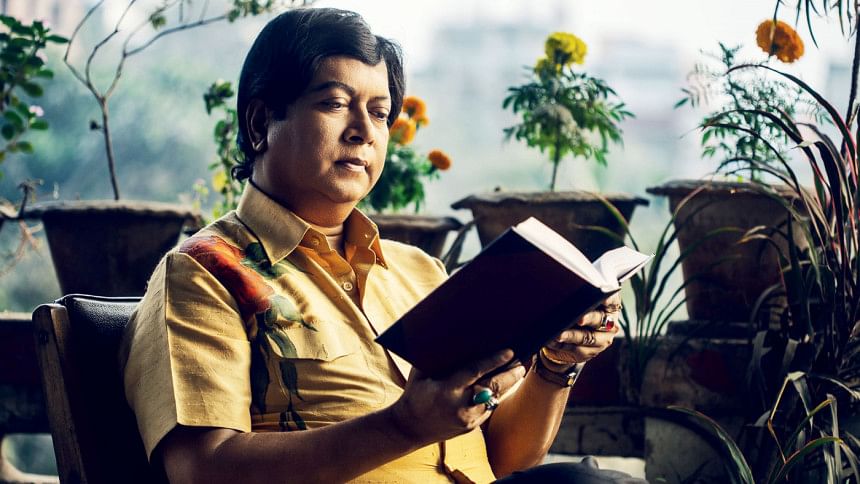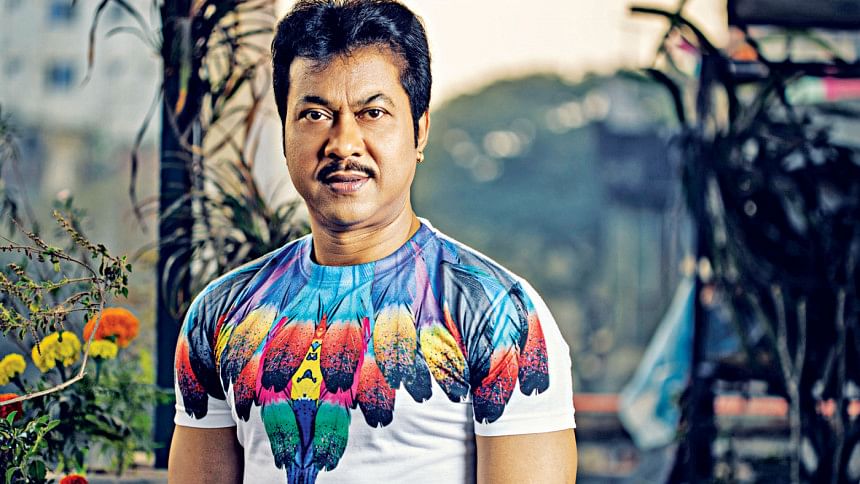ON DANCE & MUSIC

Rafi Hossain:We have lost many people throughout this pandemic, and recently Arok da. How are you coping with that?
Shibli Mohammad: Losing so many loved ones has put me down to the point where I keep expecting it's my turn to go next. Rather than feeling a sense of loss for losing them forever, I feel as though I will meet them quite soon. Arok da was very close to our family, we truly miss him.
Rafi Hossain: You have faced a lot of adversity for being a male dancer, but you're still as connected to your art as you can be. Can you tell us about that?
Shibli Mohammad: I see this in two ways. Firstly, an artist can only make a livelihood from their work if they achieve recognition. Secondly, many people ask me why there haven't been many male dancers after me. Here, I believe one reason is the lack of encouragement from parents. In addition, the amount of hard work I put in and the reyaz I did for four years in India, alongside the environment there, made me into the artist I am. I have been teaching for 30 to 35 years now, and I have had very talented students. But they don't put in any work beyond attending classes. However, I do realise that nowadays children have a lot of pressure put on them, be it from school or coaching centres. That is why dance always ends up as only being a hobby for them. When it becomes a hobby, you can only ever be an amateur artist, not a professional trying to turn it into a livelihood. There are hardly any artists in Bangladesh that can say that they do reyaz the way we did for hours, other than those who have studied in India and came back. For years we would wake up at 4 or 5 in the morning for it and spend the evening engaged in it. Moreover, they don't have the atmosphere we did, which is perhaps why our dance touched the audience so much. Channels such as BTV also helped us get where we are, and we are forever indebted to them. Back then, some producers such as Badrunnesa Abdullah would even fight for us when they would not let us wear dhutis during dances to Rabindranath's songs. We are thankful that such struggles aren't prevalent nowadays, and we can perform the way we wish to. Hopefully, we will not have to be under such a government again where we are forbidden from using modniras or putting our hands together in the manner of prayer during dances as it was deemed irreligious. Our persistence helped us get through it.

Rafi Hossain: Tell us about your family's reaction when you chose to go for an unusual career.
Shibli Mohammad: After our father passed away, our mother had big dreams while raising us. During that time, our brother had just graduated, and he was working at Biman. I was pursuing my third year of an honours degree in physics when I got a scholarship from the Indian government. Our brother, who has now passed, was crucial to convince our mother to let me go. She was worried, as Sadi had already gone to Santiniketan after getting his engineering degree. So, I gave her my word that I would complete my honours degree. I would often travel between Lucknow and Jahangirnagar University because of this. After that, I went to Pandit Birju Maharaj in Delhi, where I realised there was no looking back. Before Sadi and I started getting recognised in our fields, our relatives would often express their disappointment to our mother for not being able to guide us properly. However, soon after our success, it was as though we were in demand for every wedding and birthday party. But, I also want to mention that we weren't hurt by this, it was justified from their view as they were looking out for us. After all, the path we went on did not guarantee success. We are eternally grateful to the Almighty for blessing us and indebted to the general public for their love and support.
Rafi Hossain: Would you say you and your brother are close friends?
Shibli Mohammad: Definitely. We share everything. We have to manage the four-storeyed building by ourselves. Whenever I have any trouble resonating the meaning of a song to my dance or choreography, I try to consult him. It is especially true with Rabindra sangeet, as the composition is based on feelings. The same thing often happens with costumes as well. Sometimes I will have a costume design in my mind based on the interpretation of the song, but after a discussion with Sadi, I will go for a completely different one. As, he explains the essence and spirit of the song, which is different from what I had interpreted it to be. Even when I was a judge on BTV for Notun Kuri, I would often have 30 participants, of which 25 of them would choose to sing Sadi's songs. The producer of the show Qayyum Chowdhury would joke that the name should have been changed to Sadi Kuri.

Rafi Hossain: Can you tell us more about Pandit Birju Maharaj?
Shibli Mohammad: I first met him in Delhi, and my previous guru had sent a letter to him saying that I had potential. The moment he met me, he said, "You're from Bangladesh, the land of Sheikh Mujib!" and welcomed me with warmth. He held Bangabandhu in high regard and had the utmost respect for him. I was his first Bangladeshi student, and I received so much love from him, as much as one would from a father. Munmun mentioned one day that he holds so much love for me that she's almost envious. Even now, I video call him at least three times per month. Recently, he didn't pick up my call for a while, and when he finally did, I got to know that he had contracted the Coronavirus. Thanks to the Almighty, he is now well again. I always say that without him and his love and blessings, I would not be who I am today or even touched the lives of half the people I did. I am eternally grateful.
Rafi Hossain: How is the current state of the dancing in regards to teaching new students?
Shibli Mohammad: All gurus and teachers are working very hard right now in Bangladesh. Of course, there is some negativity in every industry, such as people going for acting and modelling to get instant fame. However, I feel most of the work is being done for the better. Parents are genuinely interested and trying hard to encourage their children, and we salute them for this. We see working parents bringing their children in and staying until rehearsals are over, even if they run as late as 1 am. However, we do have trouble getting sponsors when we want to execute the ideas we have. While people like Ameenah apa and others constantly support us, we receive almost nothing from corporate companies who would rather invest in promoting a band or fashion shows. They see no benefits business-wise from promoting such cultural events. This is why our neighbour, India, is succeeding. Moreover, no channel except BTV has a proper show dedicated to classical dance. On special days such as Eid, they say that having real artists does not attract sponsors. They prefer a model or actor with genuine dancers behind them. They push this idea to the audience, even if they do want to see proper dance. I find this to be quite insulting. There is no place for an audience that prefer more cultural programs.

Rafi Hossain: Would you like to share something with your fans and students?
Shibli Mohammad: I am happy with the staff, students, and parents we have at our foundation. I am glad about what we have achieved, and I believe myself to be very lucky. I am satisfied with what I have received until now. I especially feel so when I enter my house and see my mother's face smiling at me. The only thing I would ask from the audience is prayers for my mother. I hope everyone stays safe during these difficult times.
Shreya Shomoyeeta SADI MOHAMMAD
Rafi: How are you doing with your institution, Robiraag?
Sadi Mohammad: I am very satisfied with Robiraag. I have been running that institution for a long time now. However, nowadays we have resorted to doing classes online due to the pandemic.
Rafi Hossain: I think that no prominent Rabindra Sangeet singers are coming out of the newer generation. For some reason, the audiences are not accepting them completely, and barely any of them have been able to showcase their potential. Why do you think that is?
Sadi Mohammad: I think that talented musicians are coming from the newer generation. I don't want to mention anyone in particular, as I am no one to judge who is a good singer or not. But there are some and, in many cases, we do not see new singers coming up as they might not receive the opportunities. However, what I think many lacks is passion. To be a singer, you need to passionate and have the will to work hard. Even now, I spend all my day working on music. In the past, we had to struggle a lot as well. We had to face a lot of restrictions in music. As I recall, during one of the occasions, I was not allowed to sing two songs on the radio as it contained the word "puja", and it might anger some extremists. Overcoming all these types of difficulties, we had to stay passionate and work for the music.
Rafi: You were studying engineering when you had a change of heart and became a musician. What made you come to this path?
Sadi Mohammad: From an early age, all of us siblings were always very attracted to music. However, we were also very disciplined since we were kids. We had to be in school on time every day, come home and eat lunch and then learn more from the home tutor who would come. We would make sure to come back in the evening if we did go out to play. All ten of us siblings were well disciplined. My elder sister and I would sing a lot, and I still think that she was better as a singer than me. I would enjoy singing songs that I would hear. But, I did not learn music properly until I went to Santiniketan. When I saw how religious extremism was rising in Bangladesh following the murder of Bangabandhu, I was left very unhappy with staying here. So I decided to try for Santiniketan, and I went there.
Rafi: After losing your father in the liberation war, your mother had to raise all of you. What was her role in your life when you were growing up?
Sadi Mohammad: I think that it is sad how people always bring up stories of our fathers and fail to mention our mothers. I think we need to give more recognition to mothers. I think that the government should reward mothers for giving so much towards their children. I would be happy to never receive another award again if it meant that award would go to a mother who worked hard to help her child.
Rafi: Are you close to Shibli bhai?
Sadi Mohammad: He is much younger than me, but we still have a strong bond. We talk to each other whenever something important comes up. There are times when I am so bothered by something that I cannot sleep at night, so I ask Shibli to come to my room, and I'll tell him everything. Every time I do that, it helps me feel at ease. The bond we have is indeed strong.
Rafi: Do you think people are losing interest in getting into the music industry?
Sadi Mohammad: If we exclude the COVID-19 situation, I would say that many of the newer generations are interested in getting into the industry or learning how to sing. Many are even eager to learn how to sing online, and some are also doing it quite well. What makes me sad is how I often see some young artists who haven't even finished learning come up to me and request me to help them get on stage and perform somewhere. I think anyone wanting to get into the industry should practice and keep on singing.

 For all latest news, follow The Daily Star's Google News channel.
For all latest news, follow The Daily Star's Google News channel. 



Comments